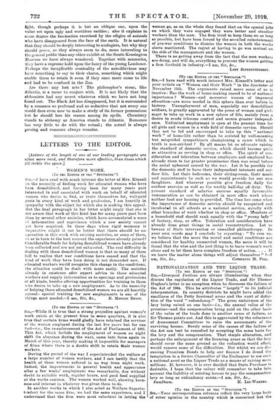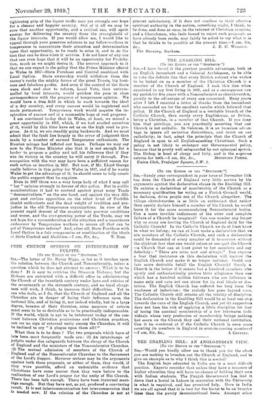[To THE EDITOR OP TEE " SPECTATOR.") &a, —Your correspondence
columns reflect the very large body of sober opinion in the country which is concerned lest the
tightening grip of the liquor traffic may yet strangle our hope for a cleaner and happier country. Out of it all we may be sure that another opportunity, and a critical one, will again emerge for delivering the country from the stranglehold of the liquor interests. If you would allow me, I would like to appeal through your generous columns to my fellow-workers in temperance to concentrate their attention and determination upon that opportunity, to be ready to seize it, and to do the best that can be done when it arrives. I do not know of any one that can even hope that it will be an opportunity for Prohibi- tion, much as we might desire it. The nearest approach to it that we can expect is the policy that the Prime Minister offered to Wales in 1917—State Purchase and Control combined with Local Option. State ownership would withdraw from the enemy's ranks the mighty forces of the great Trusts, big busi- ness and fabulous profits. And even if the control of the State were slack and slow to reform, Local Veto, then untram- melled by local interests, would quicken the pace in close correspondence with the progress of temperance opinion. We would have a free field in which to work towards the ideal of a dry country, and every success would be registered and made permanent. Temperance work would acquire the in- spiration of success and of a reasonable hope of real progress.
I am convinced to-day that in Wales, at least, we missed a great opportunity in 1917, which, if we had availed ourselves of it, would by this time have set us on the high road to pro- gress. An it is, we are steadily going backwards. And we must admit that the fault lies largely in the error of judgment then made by a number of earnest Temperance enthusiasts. The Russian mirage had inflated our hopes. Perhaps we may say now to the Prime Minister also that it is not enough for a leader to propose a policy and tell his followers that if they win its victory in the country he will carry it through. Pre- ocoupation with the war may have been a sufficient reason for such action or inaction in 1917. But now, if Mr. Lloyd George really believes in this policy for Wales in 1917, and if he wants Wales to get the advantage of it, he should come to help create the public support that lie requires.
Even in 1917 there was a very large body of what I may call " lay " opinion strongly in favour of this policy. But in public manifestations it had to contend against great noisy Trade "demonstrations " on the one hand, and against the very dili- gent and zealous opposition on the other bend of Prohibi- tionist enthusiasts and the dead weight of tradition and pre- judice in the old Temperance organizations. In view of the present rapid descent of the country into pre-war conditions and worse, and the ever-growing power of the Trade, may we not hope for a reconsideration of the situation and a unanimous endeavour by Temperance workers to secure all that can be got of Temperance reform? And, after all, State Purchase with Local Option is a fair compromise or combination of the ideals
of State Control and Abolition.—I am, Sir, &c., T. BEES.











































 Previous page
Previous page